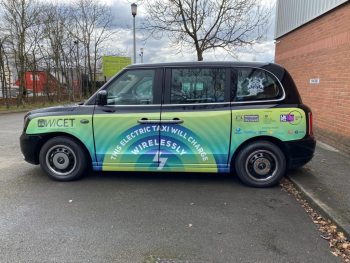Wireless taxi charging trial gets off the ground in Nottingham
A wireless charging electric vehicle trial funded by the Office for Zero Emission Vehicles (OZEV) has started deployment in Nottingham.

By using wireless charging similar to mobile phones, the project will increase taxi availability while reducing range anxiety and optimising battery usage
The WiCET (Wireless Charging of Electric Taxis) demonstration project sees nine electric taxis fitted with wireless charging hardware and go on trial for a six-month period to show how the concept of taxi rank based charging can work and how the billing system can operate.
By using wireless charging similar to mobile phones, the project will increase taxi availability while reducing range anxiety and optimising battery usage – benefiting drivers, passengers and the environment alike.
The taxis – comprising five LEVC TX range-extender electric taxis, and four fully electric Nissan Dynamo taxis – are being made available on Nottingham’s streets for hail by the general public as they capture vehicle data for the trial, including journey distances and battery level.
The first two WiCET electric taxis were fitted with wireless charging technology earlier this summer, and the remaining vehicles will be wirelessly enabled at the beginning of next year.
The vehicles are being equipped with a new green and blue livery to promote the campaign, while posters inside the taxis will help inform passengers how wireless charging works and the benefits of charging wirelessly.
Abdul Chowdhury, head of innovation, Office for Zero Emission Vehicles (OZEV), said: “Investment in research and development is key to our mission of putting the UK at the forefront of the design, manufacture and use of zero emission vehicles. By supporting these innovative technologies, we are helping to deliver our road transport decarbonisation goals, whilst anchoring economic activity across the UK.
“The WiCET project is part of our diverse innovation programme looking to address the challenges associated with the transition to zero emission vehicles. Wireless charging technology has clear commercial and consumer experience opportunities but most importantly could help address some accessibility challenges associated with charging an EV.”
Councillor Sally Longford, Portfolio Holder for Energy and Environment at Nottingham City Council, added: “While we’re proud that Nottingham’s taxi fleet already boasts a large number of electric taxis, wireless charging is the next step to make them even more convenient and easier for drivers to use – and no need for cables on our taxi ranks!
“Making our taxis cleaner will help to improve air quality in the city, and help us reach our goal of becoming the UK’s first carbon0neutral city by 2028. We’ve had a lot of positive feedback from passengers too about how much quieter and pleasant the electric taxis are. I’m looking forward to seeing this new technology trialled on our streets.”
The trial is due to complete by March 2022.












